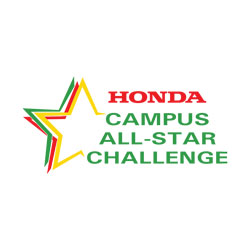HCASC History FAQ
How did the HCASC program come about?
In 1989, Honda joined with the College Bowl Company to establish the Honda Campus All-Star Challenge (HCASC), based on College Bowl—the Varsity Sport of the Mind. It's support of the unique mission of America’s Historically Black Colleges and Universities (HBCUs). Honda’s commitment to HBCUs and their communities demonstrates their belief that success is not measured only in the cars they produce, but in the lives they enhance.
How does the HCASC program benefit student participants?
HCASC is as much a personal development and learning activity as it is a game of quick recall. Participants learn first-hand how teamwork and discipline creates success They learn that pursuing knowledge for its own sake is valuable. Players respect and celebrate each individual’s contributions to the goals of their team.
How does the HCASC program benefit HBCUs?
HCASC shines the spotlight on academics, which is the core mission of the HBCUs. It unites the entire campus community -- students, faculty, staff, and alumni -- in a collaborative show of HBCU pride and excellence
Honda has awarded more than $11 million dollars in grants to the participating HBCUs. These grants enhance student programs, foster institutional advancement and improve students' college experience.
How many students have competed in HCASC and where are they now?
200,000 HBCU students have participated in Honda Campus All-Star Challenge. HCASC alumni are found across the globe, pursuing careers in science, medicine, media, aeronautics, education, industry, government and more.
Program alums give back to their alma mater and HCASC by supporting campus activities, mentoring students and stepping up to serve in their communities.
We are maintaining connections with this empowered group:
- HCASC alumni are encouraged to Log In and update your profile
- There is a LinkedIn group for HCASC alums
What is the HCASC competition structure?
From 1989 through 1995, the program involved campus competition, regionally based Sectional Playoffs and a National Championship Tournament. The finals during that time were broadcast on Black Entertainment Television (BET).
Starting in 1996, the National tier of the program evolved to an annual gathering of HBCUs to compete at a face-to-face National Championship Tournament. Every spring, students, coaches, campus coordinators, volunteers, HBCU presidents, and Honda associates gather to crown the National Champion.
Starting in 2014, teams have competed at official National Qualifying Tournaments to help determine the field for the National Championship Tournament.

